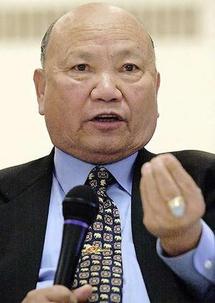
"In our measured judgement and based on the totality of the evidence in the case and the circumstances regarding defendant Vang Pao, we believe that continued prosecution of this defendant is no longer warranted," US Attorney Lawrence Brown said in a statement.
Pao is a prominent figure in the Hmong community in the United States, a former general in the Royal Lao army in the 1960s and 1970s who fled to the United States in 1975 after communists ousted Laos' royal rulers.
His arrest two years ago outraged Hmong in the United States, with large protests outside government buildings in Sacramento against his detention.
Pao and his former co-accused were arrested in June 2007 after authorities allegedly "interrupted a plot to overthrow the government of Laos by force and violence" the justice department said.
The plotters were accused of planning "to use AK-47 automatic rifles, Stinger missiles, LAW rockets, anti-tank rockets and other arms and munitions to topple (the) Lao government" and destroy government buildings in Vientiane.
Pao was born in 1931 in central Xieng Khouang province. His community, the Hmong, are a mountain people from China who practiced slash-and-burn farming, grew opium and were known in Laos by the pejorative Meo, or "savage."
A teenage soldier against World War II Japanese troops, he underwent French-run army officer training from age 20 and later fought against communist rebels.
He rose in the Royal Lao Army and in 1964 became the first Lao Hmong to achieve the rank of general.
The United States was then stepping up its undeclared war against Lao and Vietnamese communist forces in the landlocked country, training a proxy army and flying missions in unmarked aircraft of the CIA-run Air America.
From the mid-60s, Pao commanded the irregular army of Hmong, other Lao fighters and Thai mercenaries from his mountain headquarters in a campaign that some historians contend was part-financed by the opium trade.
"Operational advice was given by a small number of CIA operatives, writes Australian historian Grant Evans. "All was paid for by US aid."
Pao could supply rice and medical supplies to villagers and even control US air power, gaining him "the status of a minor deity" among his soldiers, writes another author, Christopher Robbins.
"But mostly his leadership rested on the force of his own personality, which was energetic, volatile, direct and fearless," Robbins writes in "The Ravens -- Pilots of the Secret War in Laos."
After 1975, the new Lao government jailed tens of thousands people, and around 300,000 Lao, about half of them Hmong, fled the country. Some of Pao's fighters continued a low-level insurgency that has since been all but crushed.
Their descendants have paid a high price, with up to 3,000 Hmong men, women and children still in hiding and under attack, according to overseas Hmong and international human rights groups.
-----------------------------------------------------------------------------------------------------------------------------
Pao is a prominent figure in the Hmong community in the United States, a former general in the Royal Lao army in the 1960s and 1970s who fled to the United States in 1975 after communists ousted Laos' royal rulers.
His arrest two years ago outraged Hmong in the United States, with large protests outside government buildings in Sacramento against his detention.
Pao and his former co-accused were arrested in June 2007 after authorities allegedly "interrupted a plot to overthrow the government of Laos by force and violence" the justice department said.
The plotters were accused of planning "to use AK-47 automatic rifles, Stinger missiles, LAW rockets, anti-tank rockets and other arms and munitions to topple (the) Lao government" and destroy government buildings in Vientiane.
Pao was born in 1931 in central Xieng Khouang province. His community, the Hmong, are a mountain people from China who practiced slash-and-burn farming, grew opium and were known in Laos by the pejorative Meo, or "savage."
A teenage soldier against World War II Japanese troops, he underwent French-run army officer training from age 20 and later fought against communist rebels.
He rose in the Royal Lao Army and in 1964 became the first Lao Hmong to achieve the rank of general.
The United States was then stepping up its undeclared war against Lao and Vietnamese communist forces in the landlocked country, training a proxy army and flying missions in unmarked aircraft of the CIA-run Air America.
From the mid-60s, Pao commanded the irregular army of Hmong, other Lao fighters and Thai mercenaries from his mountain headquarters in a campaign that some historians contend was part-financed by the opium trade.
"Operational advice was given by a small number of CIA operatives, writes Australian historian Grant Evans. "All was paid for by US aid."
Pao could supply rice and medical supplies to villagers and even control US air power, gaining him "the status of a minor deity" among his soldiers, writes another author, Christopher Robbins.
"But mostly his leadership rested on the force of his own personality, which was energetic, volatile, direct and fearless," Robbins writes in "The Ravens -- Pilots of the Secret War in Laos."
After 1975, the new Lao government jailed tens of thousands people, and around 300,000 Lao, about half of them Hmong, fled the country. Some of Pao's fighters continued a low-level insurgency that has since been all but crushed.
Their descendants have paid a high price, with up to 3,000 Hmong men, women and children still in hiding and under attack, according to overseas Hmong and international human rights groups.
-----------------------------------------------------------------------------------------------------------------------------









 Home
Home Politics
Politics









